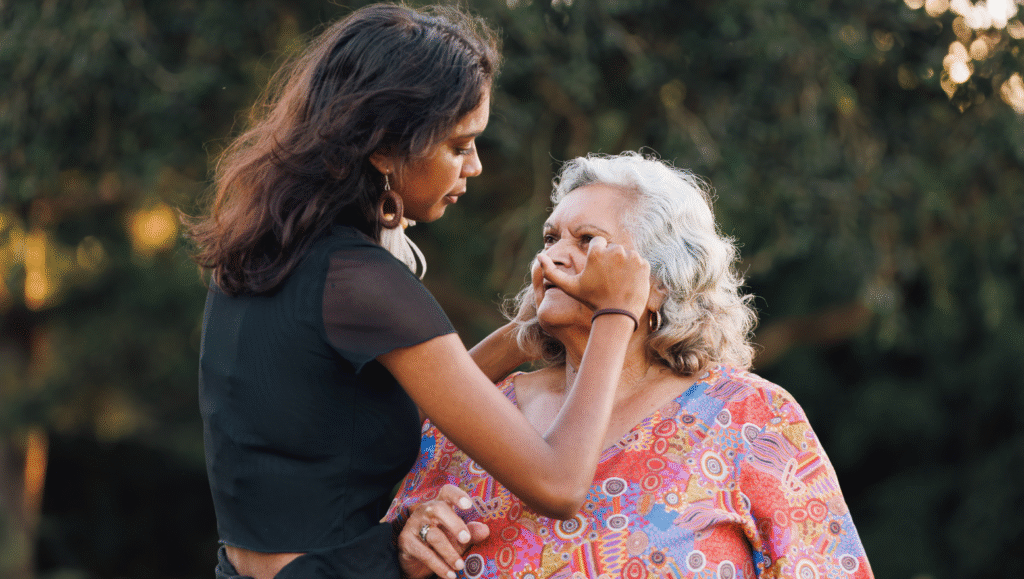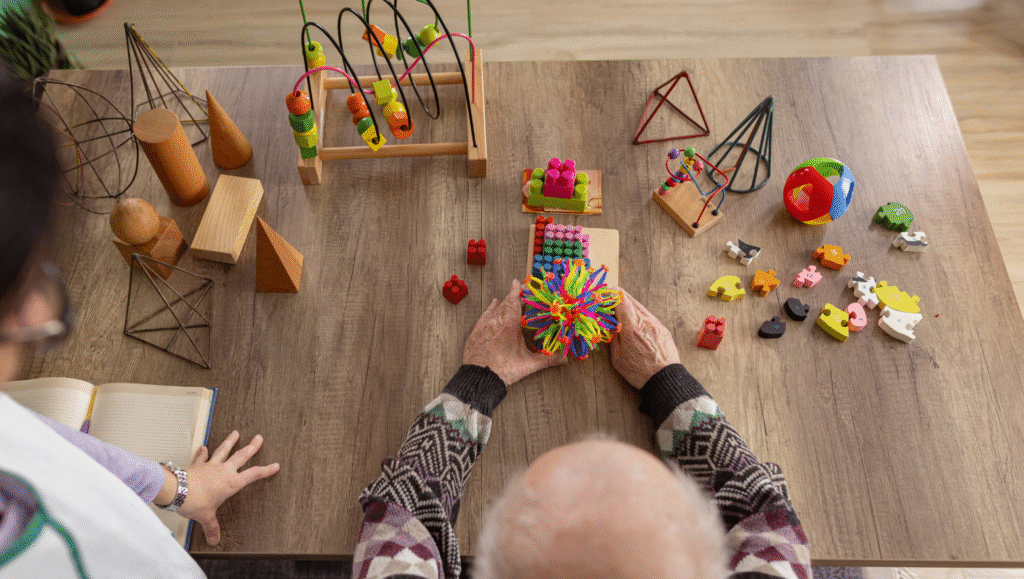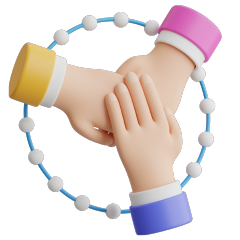What is Dementia?

Dementia is more than memory loss, it affects daily routines, independence and relationships. Let’s explore how dementia impacts a person’s life and the role of NDIS dementia support in helping them live with dignity and care.
Table of Contents
It often begins quietly. A loved one forgets a familiar recipe, repeats the same question, or misplaces belongings in unusual places. At first, these small lapses may feel like normal ageing. But over time, the changes grow more noticeable, raising a difficult question: could it be dementia?
Understanding dementia
Dementia is not a single disease, but a term used to describe a group of conditions that affect the brain. It leads to a gradual decline in memory, thinking, problem-solving, and social abilities, making everyday life more challenging over time.
While dementia is more common in older people, it is not a normal part of ageing. About 1 in 12 Australians over the age of 65 live with dementia, and rates are higher among Aboriginal and Torres Strait Islander peoples.

Common early symptoms include:
- Memory loss that affects daily life
- Difficulty planning or completing familiar tasks
- Confusion with time or place
- Changes in mood or personality
- Problems with language or communication
If you notice these changes in yourself or a loved one, it’s important to speak with a GP, as other conditions can cause similar symptoms.
Stages of dementia
Dementia is a progressive condition, which means it worsens over time. The experience varies from person to person but generally follows three stages:
Early stage – subtle changes in memory and thinking, but daily life continues with minimal impact.
Middle stage – increasing difficulty with memory, mood changes and the need for regular support.
Late stage – severe loss of memory and independence, with constant care required for safety and wellbeing.
Daily life for people with dementia

Living with dementia impacts more than just memory. Day-to-day routines like cooking, personal hygiene or remembering appointments can become overwhelming. Many people experience:
- difficulty managing household tasks
- challenges with self-care, such as brushing teeth or showering
- confusion in familiar places
- sundowning, where symptoms become worse later in the day
- emotional changes, including anxiety, frustration or withdrawal
For families, these changes can be difficult to navigate. Small tasks often require patience, repetition and reassurance which makes daily life unpredictable and emotionally demanding.
Dementia vs Alzheimer’s and other conditions
When people hear the word dementia, they also immediately think of Alzheimer’s disease, but it’s important to note that the two are not the same condition. Dementia is a general term for a collection of symptoms that affect memory, reasoning, and behaviour. Alzheimer’s is just one of several conditions that can cause those symptoms.
Although the causes and progression can vary, these conditions often bring similar challenges like memory loss, confusion or changes in mood and communication. This overlap can make it hard for families to tell them apart without medical guidance.
For example, Alzheimer’s disease is linked to changes in brain proteins, while vascular dementia often follows a stroke or issues with blood flow to the brain.
It’s also important to note that not all memory problems mean dementia. Conditions like depression, delirium, vitamin deficiencies or thyroid problems can sometimes look similar but are treated differently. That’s why medical assessment and early diagnosis are so important.
NDIS dementia support
The National Disability Insurance Scheme (NDIS) can provide funding for people living with dementia if the condition has a significant impact on their everyday life and independence. This may include assistance for those with younger-onset dementia (diagnosed under the age of 65), as well as some options for people over 65 through aged care pathways.
Under the NDIS, participants may be able to access reasonable and necessary supports to help manage the challenges of daily life. These supports can range from personal care and help with routines, to assistance with mobility, communication and participation in community activities. The goal is to make day-to-day living safer, more comfortable and more dignified.

Through NDIS dementia support, participants may access:
- Assistance with daily living – support workers who can help with personal care, meal preparation, and routines.
- Community participation – encouragement to stay socially active and engaged.
- Capacity building – support to maintain independence where possible through strategies and tools.
Beyond the NDIS, additional support is available through community health services, dementia-specific organisations, respite care programs and counselling for families and carers. These services work hand in hand to ensure that both the individual and their loved ones feel supported.
Leora Healthcare support workers are specially trained to assist people living with dementia. We focus on gentle, compassionate care that helps make daily routines easier and life more manageable for both the person living with dementia and their family.
Supports for people with dementia
While there is no cure for dementia, many supports can improve quality of life:
- Medical support – doctors and specialists provide diagnosis, medications and management of related conditions.
- Therapies – occupational therapy, music therapy and reminiscence activities can help maintain independence and wellbeing.
- Community resources – dementia-friendly groups, carer networks and culture-specific services provide connection and understanding.
- Practical adjustments – creating dementia-friendly homes with clear signage, good lighting and safe layouts can reduce confusion and anxiety.
Caring for someone with dementia
Being a carer for a loved one with dementia can be deeply meaningful, but it also comes with challenges. It’s common to feel tired, stressed or emotionally drained, especially as routines change and the person’s needs increase. Having access to respite care, support networks and mental health support can make a big difference.
Some simple strategies can make a big difference for both carers and people living with dementia. A steady daily routine often helps reduce confusion and gives the day a sense of calm. Clear and patient communication, like listening carefully and validating feelings, can ease frustration and help the person feel more secure. Around the home, small changes like adding labels, keeping spaces uncluttered and improving lighting can make everyday life feel safer and more manageable.
It’s also wise to encourage planning ahead while the person still has capacity. Advance care planning or appointing an Enduring Guardian ensures their wishes are respected and provides clarity for families later on.

Most importantly, carers should not neglect their own wellbeing. Taking regular breaks, sharing responsibilities and leaning on support services are crucial to sustaining the care and love needed for the journey ahead.
Finding the right NDIS support dementia support provider
If you or someone you love is living with dementia, it can feel like daily life is changing in ways that are hard to manage alone. But the good news is that support is out there. With the right mix of therapy, guidance and personalised supports, it’s possible to make life not just safer but also more connected and meaningful.
Contact our team today to learn more about how Leora’s NDIS dementia support workers can best help you or your loved ones.





